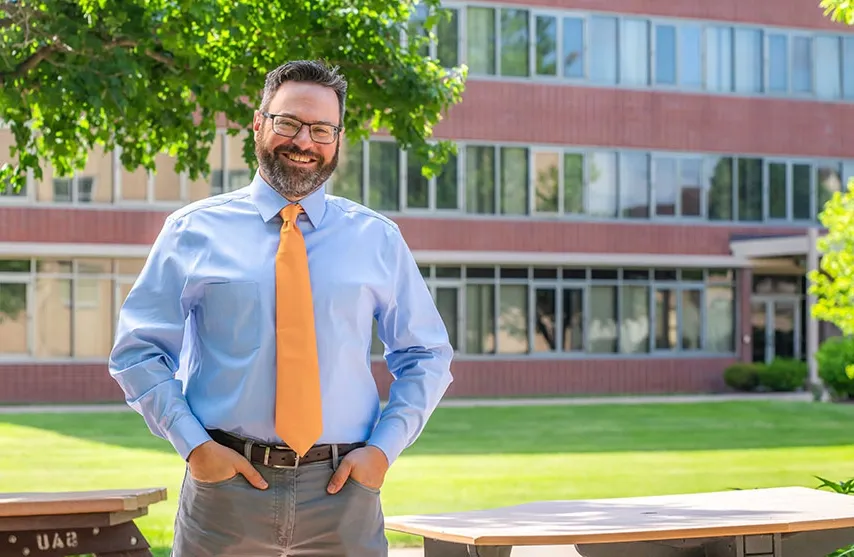An interview with Jason Richter
Jason Richter is no stranger to St. Ambrose University. In his 14 years here, he has transformed the student experience. One of his most significant accomplishments is increasing the number of student clubs on campus from 20 to 90. It comes as no surprise that his valuable leadership has been rewarded with two promotions since 2021. First to assistant dean of students and last December to assistant vice president for student services and engagement.
Passionate about student engagement and development, Richter steps into his new role with a unique perspective on the benefits of learning through extracurricular activities.
Assistant vice president for student services and engagement is a new position at St. Ambrose. What does it entail and what aspect do you find most exciting?
I think the new role allows me to work on retention and first-year experience at the same time and think more deeply about how we combine those together to really get our students to succeed and thrive here at St. Ambrose. I'm really excited about the collaborations that we have. We've been just kind of working around the edges and I think now we can go more deeply into some of those opportunities as we move forward.
The university’s renewed focus on the student experience is a pivotal aspect of your new role. How do you plan to enhance the overall experience for students?
I think for me, the overall experience is already good. Our students have great opportunities with clubs, organizations, and our athletic programs. The opportunity for me in this role is learning how to make sure students understand what skills they're learning while they're participating in these activities. It’s being more intentional about talking with them about what skills they're going to be able to use when they graduate, at their first job, and when they're volunteering in the community. It’s about illustrating the ways they can use the skills they’ve learned through their involvement in clubs, organizations, and teams to help enhance their natural abilities. This means pointing out the skills they are using in the moment, then having a debrief conversation after the activity to emphasize what skill or skills they have demonstrated or how they can enhance their abilities.
What specific initiatives, projects, or programs have you developed that align with this renewed focus on the student experience?
There are two great experiences that we're hoping to enhance. One of them is with our New Student Seminar. We’ve added some opportunities that are unique. For example, CliftonStrengths – an online test that identifies and ranks your top five strengths – is being piloted in several of our new student seminar courses this fall. Focusing on their strengths allows students to understand themselves better in team settings. It also helps them understand what they are great at and encourages them to look for jobs or activities that allow them to flourish and use those skills.
Second, Christopher Waugh, PhD, vice president for student engagement, talks a lot about the idea of pathways. That means that students know exactly who their contacts are for success here. They understand that St. Ambrose has lots of opportunities to connect with great faculty and staff mentors who can help them achieve their goals or connect them to resources. If students use these pathways, it’s going to enhance their education here at St. Ambrose.
When it comes to different student demographics like transfer, commuter, non-traditional, and graduate students, how do you envision tailoring your approach to ensure each group feels fully supported and engaged within the campus community?
Each population is unique, so it's about listening and understanding what they want out of their education. They're here for a reason. They want to get their education, and they also want to understand that they're building skills along the way.
Some students want to fully dive into clubs and organizations; some just want to get into internships and start understanding the next step for their careers. That’s why it’s important to listen to each individual and try to understand what they bring from a talent perspective and a skill development perspective, and then identify what’s missing and ensure they get what they’re looking for.
You’ve been at St. Ambrose for 14 years. What has made you stay?
The reason I stay here at St. Ambrose is because of the community. I get to talk to faculty and staff every day who I truly enjoy working with, and the students here are terrific.
I've always said that when I was in college at Mount Mercy, I doubled down and “majored” in extracurricular and co-curricular activities. That's why I'm in the job I'm in. I get so much out of interacting with people. At St. Ambrose, there's a great opportunity for those interactions on a daily basis.
As an alumnus of Mount Mercy University and as a staff member here at St. Ambrose, can you speak to the similarities in values between both schools?
One of the things that was the beauty of Mount Mercy when I was an undergrad, was that there was a focus on community and really diving into service and those opportunities. The Sisters of Mercy there on campus were some of my mentors. I worked in the cafeteria and one of my jobs was to take food down to the sisters at the convent.
The sisters taught me a lot about making sure that I was in the community, helping people out and making sure that service was a big part of my life. I feel the same here at St. Ambrose. Those connections in the community are so ingrained in the Quad Cities and so ingrained in Cedar Rapids.
That really resonates with me as we move forward with this collaboration, which I'm ecstatic about. As an alumnus, for me it's a win-win. And I can't wait to just explore and see what we can do with it.


